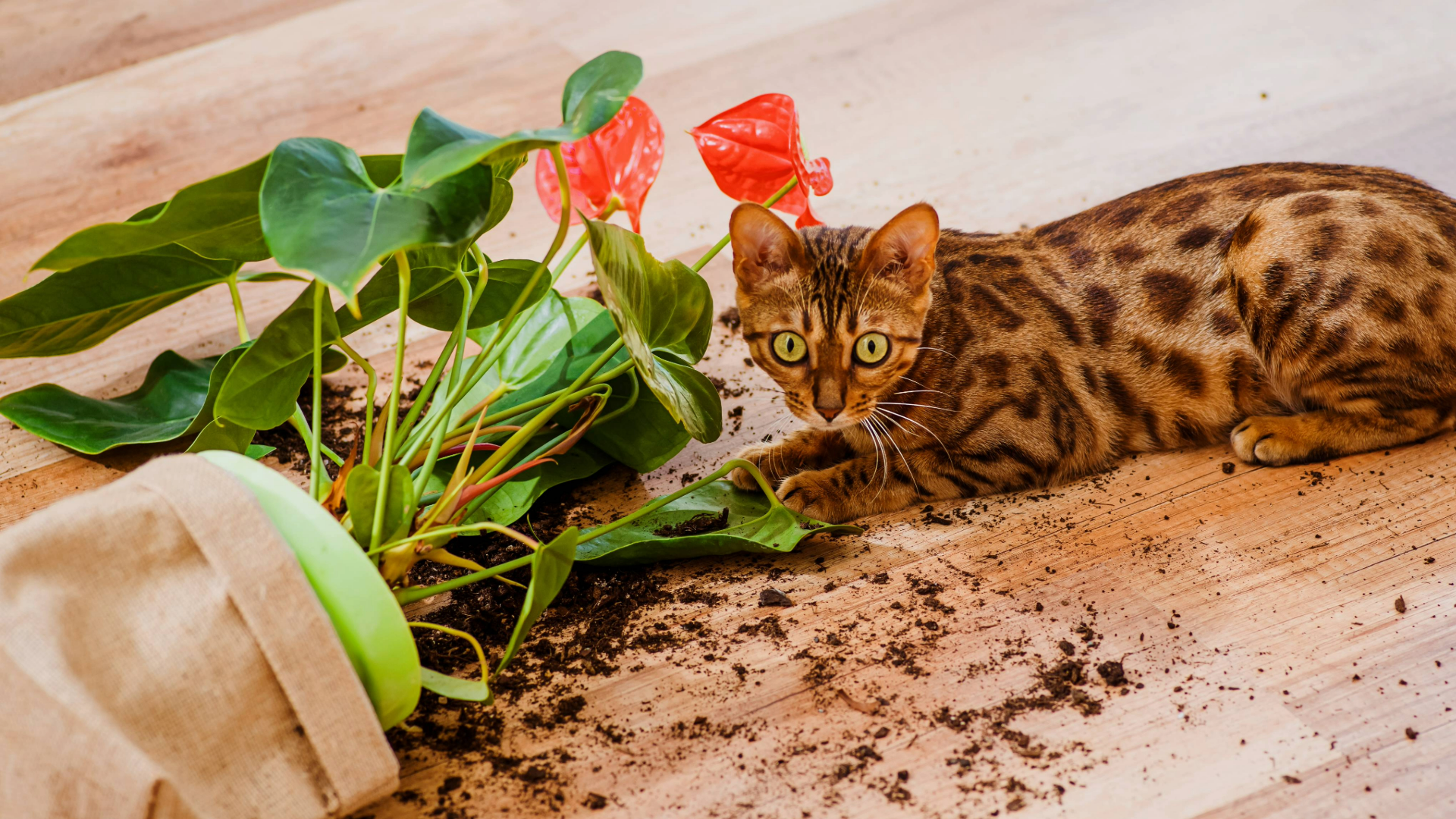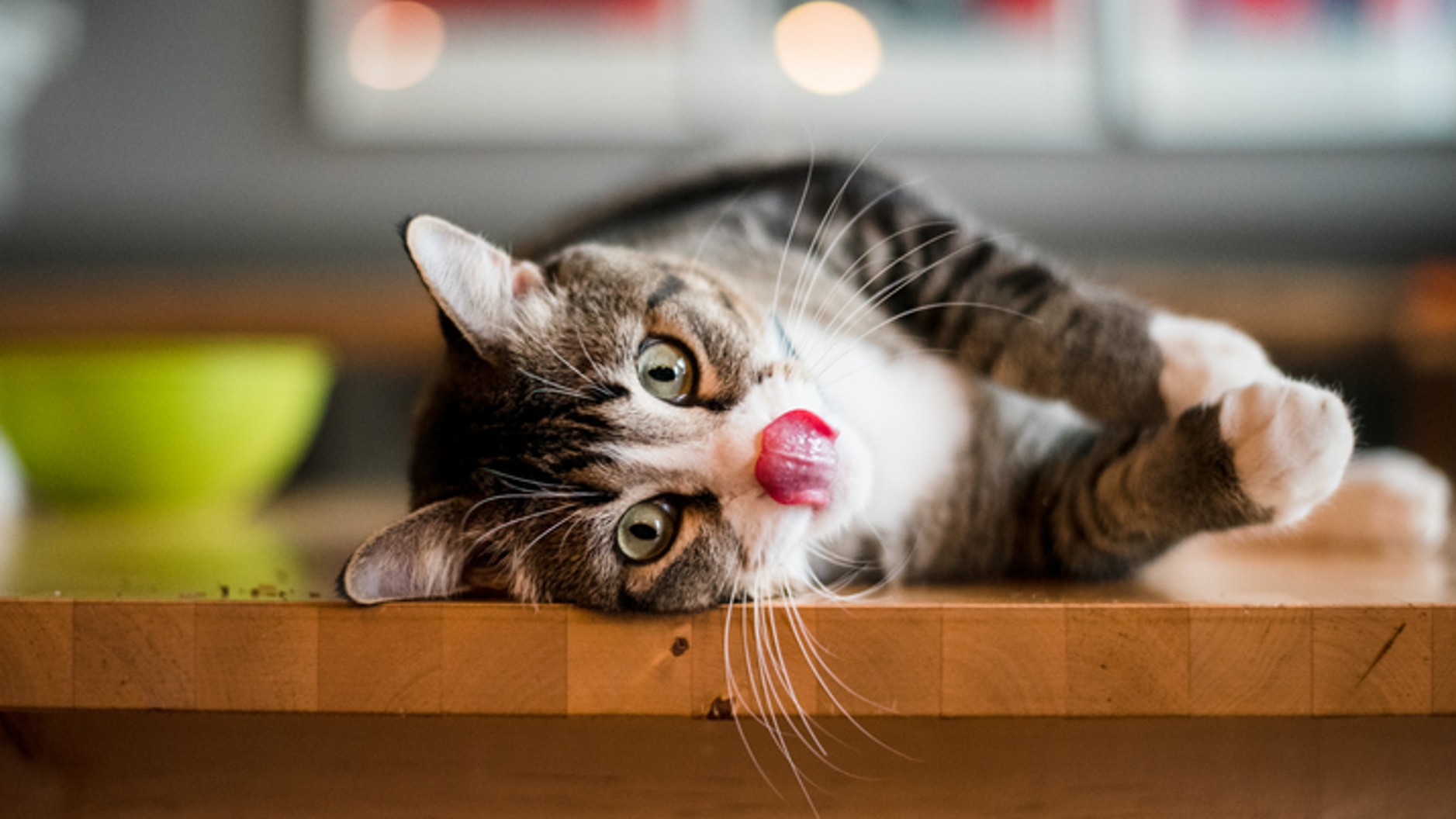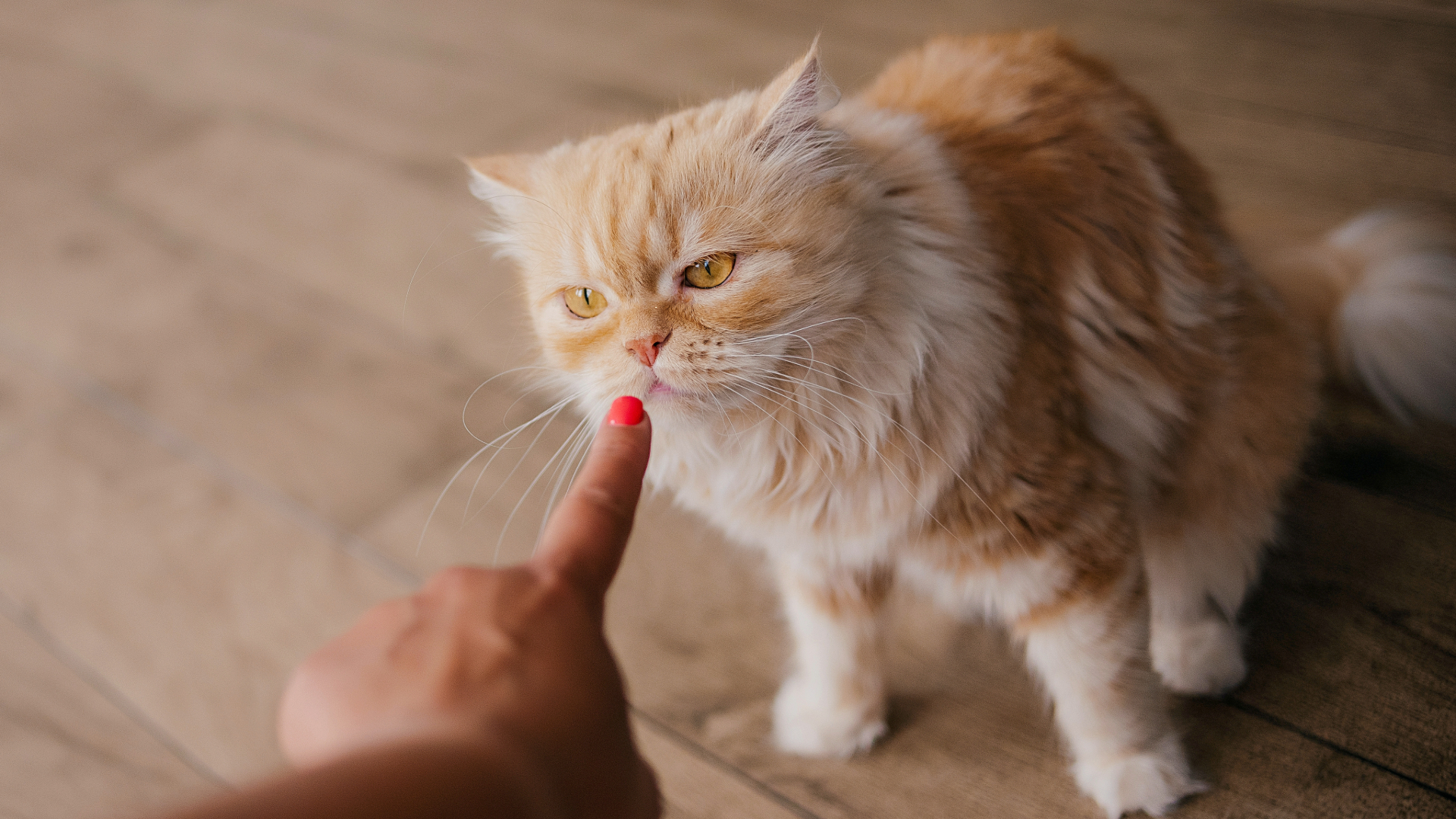How to discipline a cat and encourage good behavior, according to a vet
Want to learn how to discipline a cat? Our vet explains the best way to do it

If you’ve got a mischievous moggy on your hands, you might be wondering how to discipline a cat. While cats won’t respond in the same way dogs do, it’s definitely possible to train them – but it takes patience and time to achieve the results you want.
Cats respond well to positive reinforcement (where you reward desired behaviors), which is why having the best cat treats or best cat toys on hand can assist you in your training. In fact, using punishment methods can have the opposite effect of what you’re aiming for and may lead to issues like anxiety in cats, which could trigger even more unwanted behavior.
Whether your cat is peeing outside the litter box or scratching your favorite piece of furniture, there’s usually a reason behind their actions—they’re not doing it out of spite. Below, vet Dr. Hannah Godfrey explains the best ways to discipline a cat in each scenario and what to consider before taking action.
What should I do before I discipline my cat?
Most cat behavior problems are due to their living conditions not being, well, up to scratch! Ask yourself if there are enough cat distractions and comforts around? Do they have access to cat toys, cat trees and scratching posts? Are you spending enough time playing with and bonding with your fur baby? Is their litter tray being changed regularly enough?
Cats can be very finickity about that and then choose to show their displeasure in ways that can mean a lot more cleaning for you. Any of these issues will cause your cat distress, and that will mean that cat discipline will go out of the window.
If the answer to all of these questions is yes and your cat is still misbehaving, then your furry friend may be trying to tell you something is wrong – whether that's illness or anxiety. If you think this may be the case, it's time to whisk them off to the vet to see if they can diagnose what the problem is and help you deal with it.
And if there is still nothing wrong, there is no harm in admitting defeat and calling in a professional cat trainer who are experts in figuring out why your cat is behaving in the way it does.
Get the best advice, tips and top tech for your beloved Pets
Dr. Godfrey says: "Before you discipline your cat, it’s important to recognize that a lot of cat behavior that seems ‘naughty’ is actually normal cat behavior or a response to stress, illness, or pain. For instance, if your cat bites you when they normally wouldn’t, it could be because they have an injury that’s sore. On the other hand, if they pee behind the couch, they might have cystitis or a urinary tract infection or feel anxious or stressed."

What is the best way to discipline a cat?
The best way to discipline a cat is to encourage good behavior rather than discourage bad. For example, if they start to use the best cat scratching post rather than the sofa to exercise their claws, reward them. Give them a treat, a toy, some praise, or a bit of loving attention.
Do the same when they use the litter box, or play with their toys rather than the curtains or extension lead. This will help them understand what you like and what you don't. If possible, use the same treat for a particular kind of good behavior, the cat will then come to understand that this is linked with what they are doing and will be motivated to do it more.
Dr. Godrey says: "Positive reinforcement, where bad behavior is ignored and good behavior rewarded with treats or fusses, is much more successful. It doesn’t create any additional anxiety and allows your cat to realize that their ‘good behavior’ gets your attention much more than ‘bad behavior’ does."
Another way to reinforce your dislike of bad behavior is simply to move away from them. If they start biting your fingers during a stroking session, stop playing with them and move away. This will help them understand you don't like this action and will discourage them from doing it.
You can also use materials like aluminum foil or double-sided tape to cover places you want them to learn to stay away from. Cats don't like the texture of these materials and so will start to ignore them. You can then reinforce this behavior by giving them treats when they are near the object but not scratching at it.
Nina Ottosson by Outward Hound Buggin' Out Puzzle & Play Cat Toy
This is one of the best cat puzzle feeders we’ve ever tested and a great way to keep your kitty occupied and out of trouble. Hide their favorite treats in the compartments, and they’ll have to twist the leaves and slide the pegs to reveal them— it’s perfect for mental and physical stimulation!
Should I discipline my cat in a physical way?
The short answer is no. Physical punishments like cuffing, throwing, spanking or holding them down are more likely to do more damage than good. Any violent actions are more likely to make your cat anxious, break the bond you have built between you and will make them more aggressive to you in the future in retaliation.
This is because your cat will see you as the problem, not what they have done to cause you to do this. They won't necessarily associate your 'attack' with the crime, and the most common cause of cat aggression is fear. You don't want to be the cause of that fear.
Similarly, although picking them up by the scruff of the neck used to be a recommended practice, this should also be avoided. Yes, as kittens they go limp when their mother picks them up in this way, but this isn't a way that the mother disciplines the cat. You grabbing them in a way they don't expect is again just likely to cause fear and aggression and bad behavior is likely to increase.
This also applies to shouting at them. Yes, the loud noise will make them stop what they are doing and run away, but this isn't because they realize they've been caught doing something they shouldn't, it's because there is a big scary human making loud noises at them!
Dr. Godfrey says: "Aggressive physical or verbal discipline from humans to cats is wrong – we’re much bigger and stronger than they are, and they are dependent on us – to take advantage of this is not right and could be considered abuse.
"What’s more, if you shout at or even lash out at your cat to discipline them, it’s likely you’ll frighten them and cause them to feel stressed or anxious. Since stress and anxiety in cats can cause them to claw the furniture or carpets, or pass urine in odd places around the house, you could be making the problem worse."

Should you discipline a cat with a spray bottle?
Dr. Godfrey says: "A spray bottle might get your cat’s attention and stop them from doing what they’re doing temporarily, but it may also cause them stress, which could lead to further behavior and health problems. It’s a better idea to use positive reinforcement to reward ‘good’ behavior and show them they get more treats and attention when they don’t bite or scratch."
How to discipline a cat for biting
Cat's need to know that biting people, even in a playful way, is not a good thing from an early age. Although a kitten gnawing on your fingers may be cute, it's less cute when they are an adult cat and still haven't learned that this can hurt. Our vet's guide on how to play with a cat should give you a few good pointers on how to keep them entertained while reinforcing good behavior.
Dr. Godfrey says: "In the moment, if your cat bites you, stop playing with them or interacting with them. Don’t give a big reaction, shout, or get physical, just remove yourself from the situation until they’ve calmed down.
"The next time you interact with them, reward them for being friendly, either with a treat, a scratch under the chin, or whatever they like most. Remember to always move away and end your interaction if they bite, and over time they’ll realize that you won’t stick around for playtime if they bite. Of course, if they’re biting in a situation where they wouldn’t normally, it’s a good idea to get them checked by a vet, in case they’re ill or in pain."

How to discipline a cat for attacking
Dr. Godfrey says: "If your cat regularly attacks you out of the blue, disciplining them is unlikely to work. Try positive reinforcement, but if this doesn’t work it’s best to get them checked by a vet. If the vet can’t find an underlying reason, it would be worth consulting a qualified veterinary behaviorist."
How to discipline a cat for scratching the furniture
Although it's tempting to shout at or throw something at a naughty cat who's exercising their claws on your furniture, again this may be detrimental to your relationship with your kitty.
Instead ensure they are provided with something they can scratch – like a scratching post, and reward them when they use it. You can deter cats from scratching certain area using scents or coverings, which will help solve the problem in a more passive way.
Dr. Godfrey says: "Cats don’t scratch the furniture to be ‘naughty,’ it’s a natural and normal cat behavior. When cats scratch, they release and spread their scent from the scent glands on their paws, so not only does scratching keep their claws in good condition, it also helps them mark their territory.
"It’s not fair to discipline your cat for normal behavior, nor is disciplining them likely to be successful. Instead, provide them with plenty of places to scratch safely – a cat tree, scratch mat, or scratch post are just some of the options out there. Use cat nip, toys, or pheromone spray to attract their attention to the designated scratching areas, and give plenty of positive reinforcement when they use them instead of the couch or carpet!"
Feliway Classic Cat Calming Pheromone Diffuser (30 Day Starter Kit)
This vet-recommended diffuser mimics natural feline pheromones to help your cat feel relaxed and prevent destructive behaviors like scratching. It’s non-sedating, drug-free, and safe for use around other pets.
How to discipline a cat for accidents outside of their litter tray
It's usually relatively easy to litter train a kitten and if they are already litter trained, cat's will usually only start going to the toilet somewhere else if something is wrong. It may be as simple as something like the litter tray is unclean and they are avoiding it because of that. In this case, you'll want to read our guide on how to reduce cat litter smells and how to clean a litter box.
They may also have become more anxious due to a change in circumstances or due to feeling under the weather. If there is a sudden change in their behavior when they used to be good at using the tray, it's likely that they are telling you something is wrong, and a visit to the vets is likely in order.
Dr. Godfrey says: "Passing urine or feces outside of the litter box isn’t a sign of a naughty cat. It usually means there’s something wrong. This could be cystitis, a urinary tract infection, stress, diarrhea, or even constipation, but it might be that the litter box isn’t clean enough or your cat doesn’t like the type of cat litter.
"Disciplining your cat is likely to make them feel more stressed and anxious, which could make them more likely to pass urine and feces outside of their litter box. Instead, make sure you have enough litter trays available (one per cat plus one extra) and keep the litter box clean. It’s also a good idea to take them to the vet to see if there’s a health problem and consider consulting a veterinary behaviorist if the problem persists."
How to discipline a kitten
Dr. Godfrey says: "Kittens, although they can be balls of mischief, are still learning. While kitten behavior can seem naughty and is often destructive, it’s all part of how kittens explore the world. That being said, there are some things you can do to try to reduce the damage to your home and keep your kitten calm and contented.
Rather than disciplining them, provide plenty of toys and spend lots of time playing with them to burn their energy and prevent boredom. Make sure they have cat trees and scratch posts where they can practice using their claws and climbing without destroying your curtains. Finally, every time they use their toys or the scratch post, reward them with verbal praise, a fuss, or a treat."
Want more cat behavior tips? Read: How to keep cats from scratching furniture and how to get cats to use their scratching posts.

Hannah graduated from the Royal Veterinary College in 2011 and began work straight away at a busy mixed practice. Initially, she treated all species, but focused on small animals from 2014. She has a passion for soft tissue surgery, ultrasound, and canine and feline dentistry, having completed additional training in these areas.
She then began working at a smaller, independent practice close to home, in order to devote more time to her other love – writing comedy fiction. In February 2023, she moved from permanent clinical vet work to become an Editor for a global medical communications company. She hasn't given up clinical work altogether, though, and still does regular locum shifts at her local vet practices.
Jamie Middleton is a freelance editor and writer who has been editing and creating content for magazines and websites for over 20 years. As well as writing about the pets he loves, he has helped create websites about tech and innovation like TechRadar.com, Innovate UK and TechSPARK, written programmes for music festivals, books on inventions and architecture, TV listings magazines, and edited publications about cars such as Lexus, Toyota and Jaguar. In his spare time he writes fiction books and poetry - or at least he does when he is permitted to by his cat Pirate, who enjoys the warmth of laptops too much to allow being creative to get in the way.



